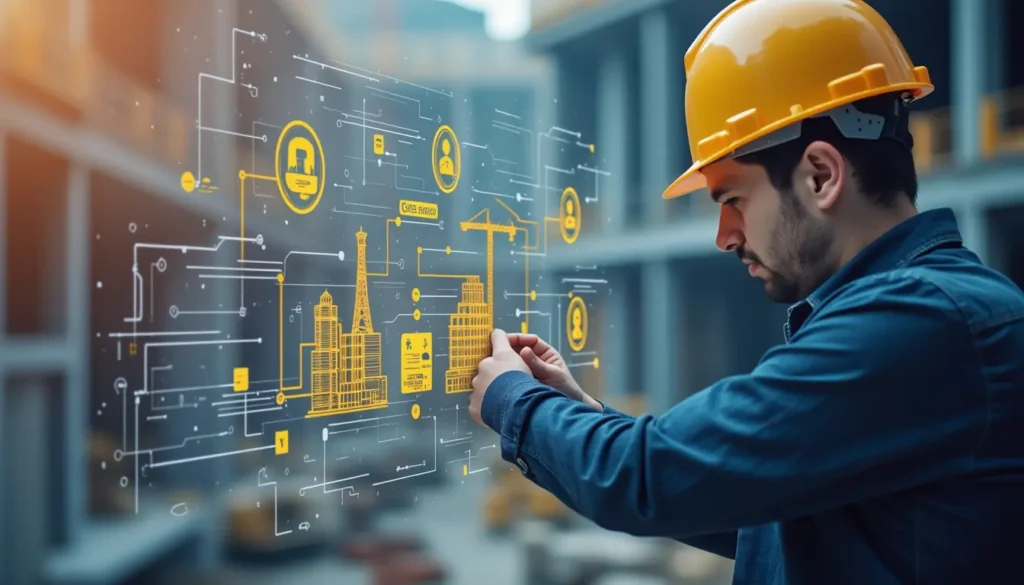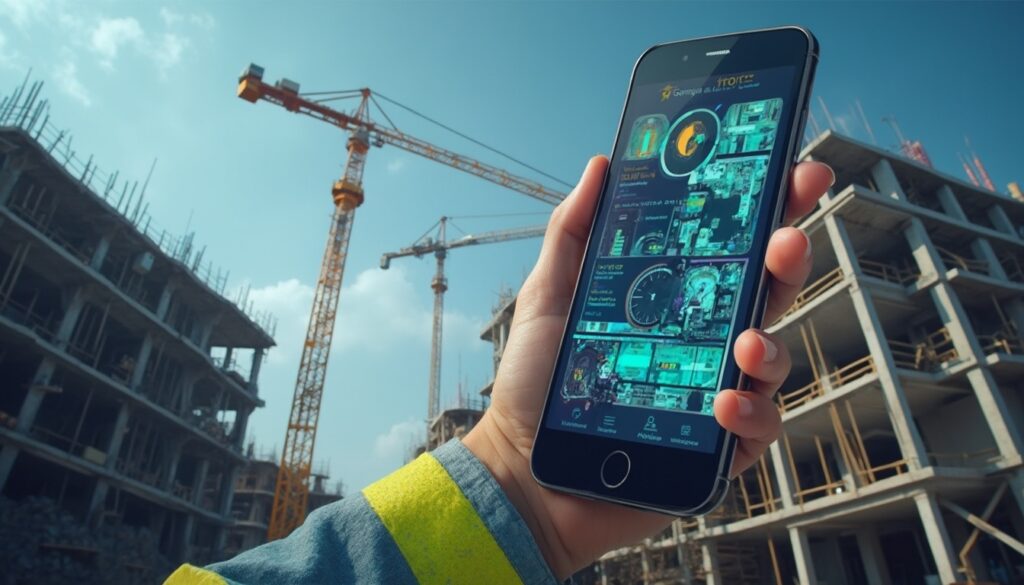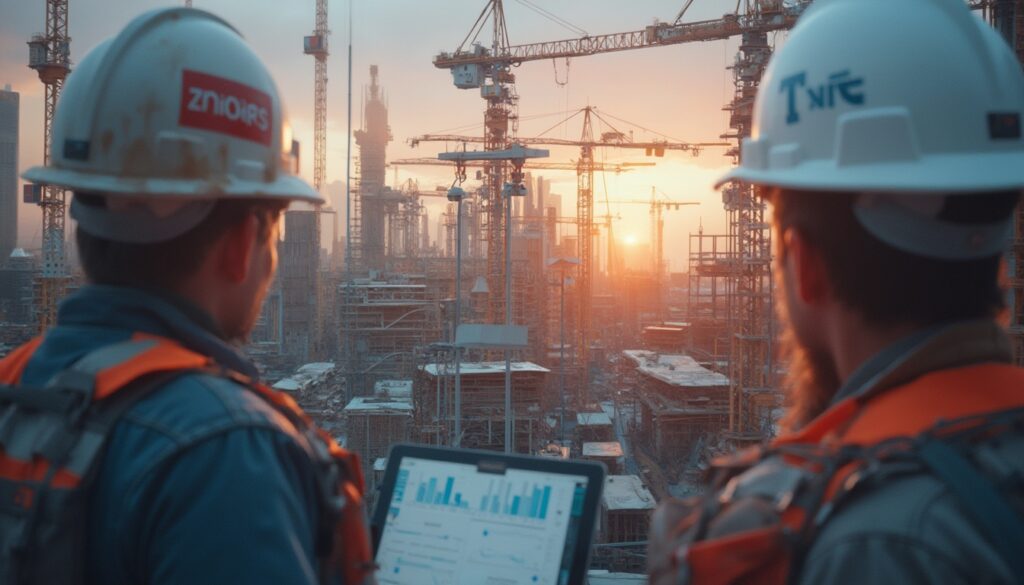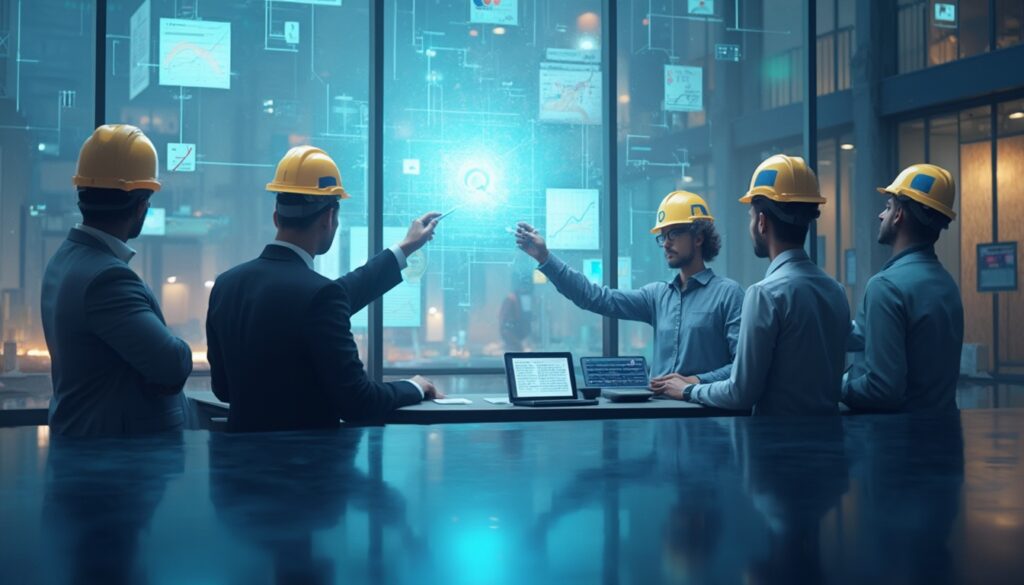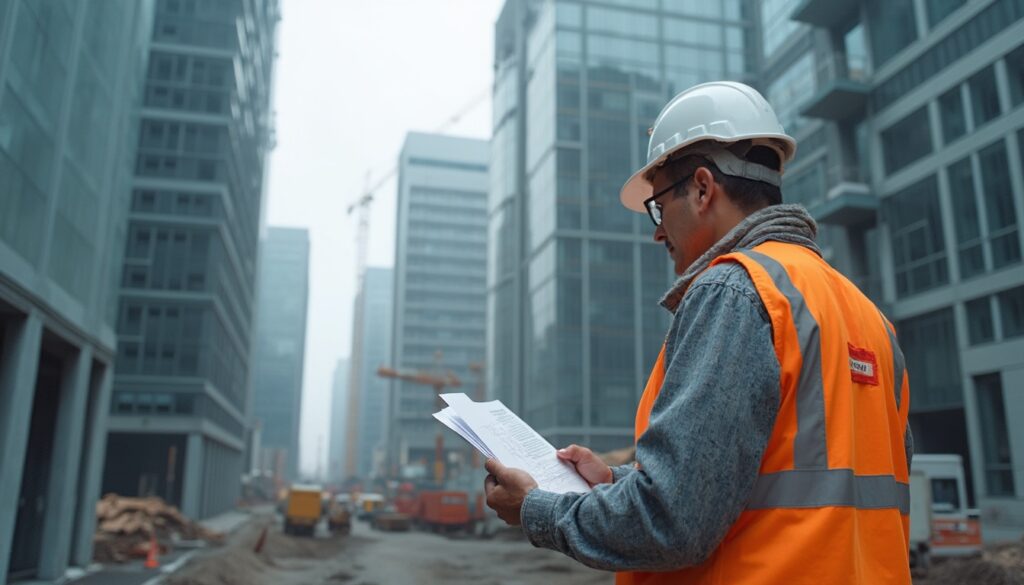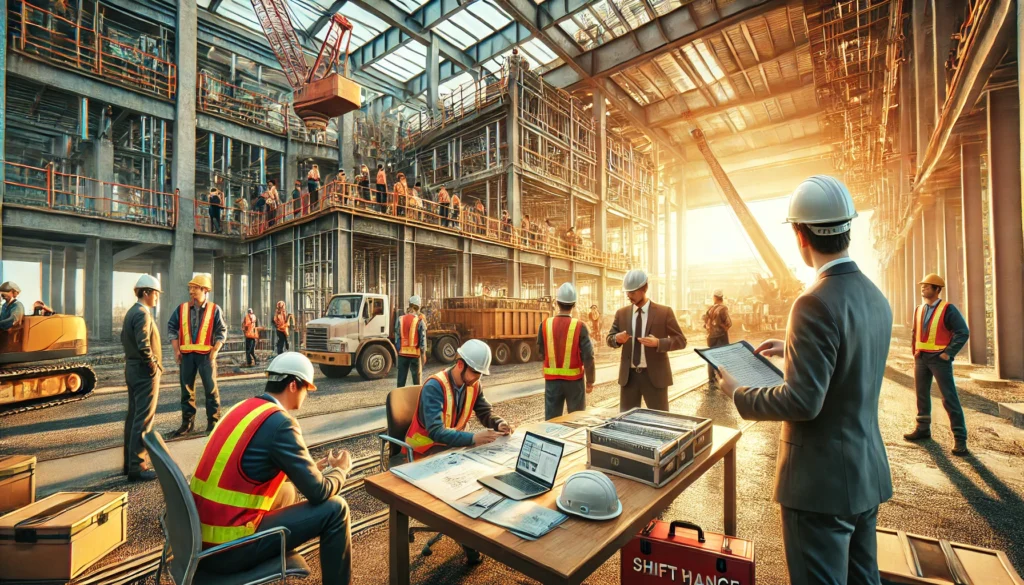AI in the construction industry: How intelligent technologies are revolutionizing your projects!
Section 01 – Introduction: AI in the construction sector – More than just a trend
We in the construction industry all feel it: Something is happening! And at the center of it is the Artificial Intelligence (AI) – it truly is the key to a real transformation, with the role of AI in the construction sector becoming increasingly clear. Many of you are surely wondering how AI in the construction industry can change everyday work. And no, this is not a short-term hype, but a profound shift that elevates efficiency, safety, and sustainability to a whole new level. If we AI in the construction industry integrate correctly, we can not only optimize old processes but also open entirely new doors when we fully leverage the potential of AI in the construction sector . This is where we at Valoon GmbH come into play: We understand the challenges, but also the vast potentials, and we want to show you how to utilize this technology for yourself. Let’s discover together how your projects can take off with AI!
- Drivers of transformation: AI is not just a trend, but the key to real transformation in the construction industry.
- Creating added value: It elevates efficiency, safety, and sustainability to a new level.
- Unlocking potentials: With AI, old processes can be optimized and new opportunities can be explored, especially through targeted AI in the construction sector.
- Partners for change: Valoon GmbH supports you in effectively utilizing this technology.
What does AI actually mean for the construction industry?
What does this concretely mean for us in the construction industry when we talk about AI in the construction industry ? At its core, AI helps us sift through vast amounts of data, uncover patterns, and make smart decisions based on that. The application of AI in the construction sector is a prime example. Imagine: from the automatic review of building plans to optimized workflows, to predictive maintenance of buildings. Practically, AI can assist us in cracking complex problems, where we humans sometimes hit our limits – just think of coordinating hundreds of tasks on large construction sites or early detection of construction defects through clever image recognition. The applications are truly diverse and span across almost every area of a project, from the initial spark of an idea to the finished building and beyond.
Why is AI particularly relevant for the construction industry now?
But why is AI in the construction industry right now such a hot topic? Several factors are coming together: cost pressure is increasing, skilled workers are hard to find, and calls for more sustainability and efficiency are growing louder. To be honest, we in the construction industry lag a bit behind in comparison to other sectors when it comes to digitalization – but this also means a huge potential for improvements through AI and specifically through the deployment of AI in the construction sector! Only now, with all the data from BIM (Building Information Modeling) and other digital tools, do we have the foundation for truly meaningful AI deployment. Moreover, AI technologies are becoming increasingly accessible and better, making them interesting even for us small to medium-sized businesses. The pressure to deliver projects faster, cheaper, and of higher quality is a real engine for the adoption of AI in the construction industry.
An overview of the diverse applications of AI in construction
Let’s take a look at where AI in the construction industry can mix in – and that’s actually quite a lot, throughout the entire lifecycle of a building. Already in planning, AI can assist us with Generative Design to quickly create and evaluate hundreds of design options. In project management, AI is a strong partner for risk assessment and scheduling. On the construction site itself, autonomous robots and drones can take over monotonous or dangerous jobs. Additionally, in materials management, logistics, security monitoring, and later in facility management, AI is becoming increasingly important because it optimizes processes and helps us make decisions based on facts. This versatility simply shows the power that AI has. AI in the construction industry immer wichtiger, weil sie Abläufe optimiert und uns hilft, Entscheidungen auf Basis von Fakten zu treffen. Diese Vielseitigkeit zeigt einfach, was für eine Wucht KI hat.AI in action: More efficiency for your construction projects – from planning to execution!
Section 02 – The key application areas: Where AI really helps in construction
Artificial intelligence is transforming specific areas in construction by improving our processes and showing us new ways forward. The application of AI in the construction sector is no longer a distant vision of the future, but is already a reality in many projects. From the first draft to the handover of keys and even beyond, AI provides us with the tools to increase precision and reduce costs, and the strategic application of AI in the construction sector plays a central role in this. Crucial for success is that we well integrate AI systems into our existing processes, for example, by linking them with BIM data. Now let’s take a closer look at which core areas AI in the construction sector are already seeing significant changes and are decisively shaping the future of the construction industry. Planning and design: Generative design and BIM integration
Planung und Design: Generative Design und BIM-Integration
Especially in the planning and design phase, AI in the construction sector can truly shine. Tools like focus on Generative Design. This helps architects and planners develop countless design options based on specifications such as area, number of units, or desired green space. Such AI systems can calculate millions of variants to find the best solutions in terms of energy efficiency, costs, and sustainability . When we also link AI with our BIM systems, we can analyze 3D models much more accurately. This improves construction planning and reduces errors. For instance, it allows for early detection of collisions between different trades or more precise determination of material needs – making the planning phase significantly more efficient.
Project management: Increasing efficiency and minimizing risks
In project management, the use of AI in the construction sector is invaluable for managing complex processes and minimizing risks. AI systems can scour contracts and emails to identify potential claims early and assess them. Predictive Project Management, as offered by ALICE Technologies, uses AI to predict delays and optimize construction schedules based on past data and current project information. The AF GROUP used such AI project software to analyze 300 alternative scenarios, thus reducing project duration by 18% and costs by 15%. This demonstrates how. Die AF GRUPPEN hat mit so einer KI-Projektsoftware 300 alternative Szenarien durchgespielt und dadurch die Projektlaufzeit um 18% und die Kosten um 15% gesenkt. Das zeigt, wie AI in the construction sector helps us make better decisions and achieve proactive risk management .
Execution of construction: Automation and robotics on the construction site
On the construction site itself, we greatly benefit from advancements in AI in the construction sector, especially through automation and robotics. Autonomous construction machinery like excavators and bulldozers, controlled by AI, perform tasks such as earth excavation with higher accuracy and efficiency. AI-controlled robots take over repetitive and physically demanding tasks, such as masonry, formwork, or reinforcement. This not only boosts productivity but also makes the construction site safer. Drones with smart image recognition systems monitor construction progress, document everything thoroughly, and identify safety risks or deviations from the plan. These technologies help us deploy our personnel optimally and ensure the quality of work.The advantages of AI in construction: Lower costs, higher quality, and a boost for sustainability!
Section 03 – Concrete benefits: What does AI really bring to the construction industry?
When we employ AI in the construction sector , it’s not just a technical gimmick. It brings us tangible benefits that positively impact the economic viability, quality, and sustainability of our construction projects. Companies that get on board early can achieve real competitive advantages. The art of utilizing data smartly leads to better processes, lower costs, and happier project partners. With AI in the construction sector , we can manage typical problem areas like skyrocketing budgets and project delays much better. Let’s take a closer look at the specific advantages that strategic AI deployment in construction brings.
- Increasing profitability: AI leads to better processes and lower costs.
- Improving quality: More precise workflows and fewer errors are the result.
- Promoting sustainability: Resource conservation and optimized material use become possible.
- Securing competitive advantages: Early deployment of AI provides a market edge.
Increasing efficiency and reducing costs
One of the most compelling advantages of AI in the construction sector is the significant increase in efficiency and the associated cost savings. Through optimized planning, such as with Generative Design, we can shorten construction times and reduce planning errors. AI-driven calculation tools like Cosuno enable more accurate cost estimates, as they access vast amounts of data and constantly learn. On the construction site, robots and autonomous machines create faster workflows for routine tasks. Furthermore, AI helps us plan material needs precisely. This means AI in the construction sector, den Materialbedarf exakt zu planen. Das bedeutet less material waste and thus direct cost savings. A study even shows that AI can reduce costs in construction projects by up to 15%.
Improved quality and precision
The use of AI in the construction sector also helps us noticeably improve the quality and accuracy of construction. Automated processes based on data analysis make us less susceptible to human errors. AI-controlled machines and robots work as precisely as is often hard to achieve manually – a real advantage in complex constructions. Real-time monitoring systems, such as drones with image recognition, allow for constant quality control throughout the entire construction process. Deviations from the plan or potential defects can thus be detected and resolved early, before they lead to larger problems and costs. The anomaly detection via AI plays an important role here in securing long-term construction quality.
Sustainability and resource conservation
Sustainability is a huge topic, and AI in the construction sector makes an important contribution here. By optimizing resource consumption, such as through precise material needs planning and less waste, we conserve valuable raw materials. AI systems support us in implementing a sustainable circular economy, enabling traceability of materials, as seen in solutions like SAP’s Circular Economy 2.0. In building operations, AI can improve energy efficiency by intelligently controlling heating, ventilation, and air conditioning, adapting to user behavior and external conditions. This not only leads to lower operating costs, but also to a smaller carbon footprint of our buildings.
Key benefits of AI in the construction industry
Here are some of the main benefits you can achieve through the use of AI in the construction sector :
- Increased productivity: By automating routine tasks and optimizing planning, projects can be completed faster, increasing overall productivity. Reduced error rates:.
- Reduzierte Fehlerquoten: AI systems analyze data more accurately and control machines more precisely than humans often can. The result: fewer errors and rework.
- Improved safety standards: AI-supported monitoring systems can detect hazards on construction sites early and prevent accidents. This significantly enhances work safety.
Introducing AI in construction: These hurdles regarding data, law & acceptance you should be aware of!
Section 04 – Challenges and Risks: Where are the stumbling blocks?
Despite all the advantages, the introduction of AI in the construction sector is naturally not without its pitfalls. It’s crucial that we are aware of potential stumbling blocks to address them from the outset and increase the success rates of our AI projects. The digital transformation, which comes with AI, not only requires new technology but also a change in corporate culture and our processes. The specific risks associated with AI in the construction sector range from technical limitations to legal uncertainties and the necessity to involve our employees in this transition. A thorough examination of these points is essential for a long-term successful AI strategy and to fully utilize the digitization in the construction industry .
Data quality and availability
One of the biggest hurdles for the meaningful use of AI in the construction sector is the quality and availability of our data. AI models are only as intelligent as the data we feed them. In the construction industry, where digitization is often not as advanced, data is often scarce, inconsistent, or not in the right format for AI analyses. Many underestimate the effort required for data preparation and structuring. We need a clear data strategy to collect comprehensive and accurate data that is suitable for AI applications. Without a solid data foundation, AI systems can produce inaccurate or even wrong results, severely limiting the benefits of AI in the construction sector of course.
Legal and ethical aspects
The use of AI in the construction sector also raises tricky legal and ethical questions. A major topic is liability: Who is responsible if an AI system makes a mistake that leads to property or even personal damage? Current legislation often does not provide clear answers. Data protection, keyword GDPR, is another challenge, especially when we use drones and cameras for site monitoring. The new law presents us with additional requirements, for example, employees must be trained in handling AI systems. These points require careful examination and clear rules, to minimize risks.
Acceptance and resistance
Whether the introduction of AI in the construction sector will be successful depends crucially on the acceptance of our employees. There is often skepticism or even resistance toward new technologies, usually out of fear of job loss or because of a lack of trust in the systems. It is extremely important to involve employees early in the change process, clearly communicate the benefits of AI, and offer comprehensive training. Internal pioneers and an open error culture can help alleviate concerns. Leaders play a key role here: They must exemplify a positive attitude toward AI in the construction sector and clarify that AI is meant to support us, not replace us.Successfully establish AI in construction: With strategy, data know-how, and the team towards the goal!
Section 05 – Best Practices: Successfully implementing AI in construction
For the successful implementation of AI in the construction sector to really work, we need a strategic and well-thought-out approach. It’s not enough to simply purchase technology; rather, AI must be understood as an integral part of corporate development. Companies that follow best practices can fully harness the potential of AI while minimizing risks. This starts with a clear definition of objectives and extends to the continuous adjustment of systems during operation. We at Valoon GmbH are happy to assist you in the development and implementation of your individual AI strategy to ensure that AI in the construction sector becomes a success factor for your company and positively shapes the future of technology in the construction industry. positiv gestaltet.
- Strategic approach: A well-thought-out strategy is crucial for AI success.
- Integral part: AI must be seen as part of corporate development, not just as a technology purchase.
- Utilize best practices: Adhering to proven methods maximizes potential and minimizes risks.
- Continuous adjustment: From goal definition to ongoing optimization, a continuous process is needed.
Strategic planning and leadership
A successful AI introduction must be desired and actively driven by top management. It is the responsibility of leadership to recognize the transformative impact of AI in the construction sector on business models and processes and to develop a clear vision. Dedicated digitalization departments or appointed AI coordinators can help structure and accelerate the rollout. It’s important to define concrete use cases and measurable goals, so we can demonstrate the benefits of AI investments and clarify the added value of AI in the construction sector is evident. A strategic approach ensures that AI projects contribute to major corporate goals and do not just end as pure technology experiments.
Data management and quality
Solid data management is crucial for the successful use of AI in the construction sector. This includes a comprehensive data strategy that defines what data we collect, how we store, prepare, and protect it. Ensuring high data quality Sicherstellung einer hohen Datenqualität is essential, as faulty or incomplete data can lead to incorrect conclusions from our AI systems. Consistent interfaces and data formats make it easier to integrate AI into existing IT systems and exchange data between different systems. We must pay particular attention to protecting sensitive data and complying with data protection policies, for example, through anonymization or pseudonymization. Investing in good data infrastructure is a prerequisite for powerful AI applications..
Employee training and involvement
People are the key to success in implementing AI in the construction sector. Comprehensive training programs are necessary to equip employees with the required skills for dealing with new AI systems and to alleviate fears. Transparent communication about goals, benefits, and also the limitations of AI promotes acceptance and trust in the technology. It’s important to create an atmosphere of collaboration, where humans and AI operate as a team and complement each other. By involving employees in the selection and design of AI solutions, they can better identify with the new tools and contribute valuable practical knowledge. Fostering a learning organization is essential for the sustainable utilization of AI in the construction sector.
Important steps toward AI implementation
For a successful introduction of AI in the construction sector we recommend the following steps:
- Needs analysis and goal definition: Identify specific problems or processes that can be optimized using AI and set clear, measurable goals. This ensures that AI investments deliver real added value.
- Establish data groundwork: Assess the existing data quality and quantity. Develop a strategy for data collection, preparation, and management. Without a solid data foundation, effective AI is impossible.
- Start pilot projects: Begin with manageable pilot projects to gain experience and demonstrate the benefits of AI within a limited scope. This minimizes risks and builds acceptance.
AI successes in construction: These examples show how it’s done!
Section 06 – Success stories: Who is already successfully using AI in construction
The entire theory around AI in the construction sector becomes tangible through concrete success stories. Many companies have already recognized the potential of this technology and are profitably employing AI in their projects. These case studies not only demonstrate the diverse applications but also the measurable results that can be achieved through the use of AI in the construction sector . From reduced costs to time savings to improved quality – the practical examples prove that AI is no longer a distant dream but a powerful tool for today’s construction industry. By examining these success factors, other companies can take valuable ideas for their own AI strategy and pave the way for broader utilization.
Case studies from companies that have successfully implemented AI
Several pioneers in the construction industry impressively showcase the benefits of AI in the construction sector. The AF GROUP for example, has used the ALICE AI project software to create over 300 alternative project scenarios. The result: an impressive reduction in project duration by 18% and costs by 15%. The real estate company NREP relied on generative design tools from Autodesk Forma (formerly Spacemaker) to optimize projects, thus creating 6% more living space and improving daylight yield. The Austrian motorway company ASFINAG utilizes the Building Information Cloud to visualize construction data and optimize logistics processes. Large players like PORR are also actively conducting pilot projects with selected construction teams to learn and implement the targeted use of AI. These examples show that AI in the construction sector can lead to significant improvements across the industry.
Analysis of success factors
The successful implementation of AI in the construction sector depends on several key factors. A clear strategic orientation, backed by corporate management, is crucial. Companies must determine which specific problems they want to solve with AI. Secondly, high data quality and availability is essential; AI systems require clean, structured data to deliver accurate results. Thirdly, engaged and well-trained employees play a crucial role. The acceptance and know-how of users are critical to success. Fourthly, a gradual development and continuous improvement have proven effective. Instead of waiting for the perfect total solution, companies should start with pilot projects and gradually optimize and roll out AI systems. The combination of these factors allows for fully tapping into the potential of AI in the construction sector .The future with AI in construction: These are the trends and potentials we are focusing on!
Section 07 – The Future of AI in Construction: Trends and Outlook
The development of AI in the construction sector is only just beginning, but the trends and potentials we are already seeing are truly promising. The technology is rapidly evolving and constantly opening up new fields of application and optimization possibilities, highlighting the importance of AI in the construction sector . We can expect that AI will become an integral part of most construction projects in the coming years, from small renovations to massive construction endeavors. The advancing digitization of the sector provides the necessary foundation for increasingly intelligent and autonomous systems. Companies that are already engaging with future developments of AI in the construction sector are optimally positioning themselves for tomorrow’s competition and can actively shape the revolution in the construction industry. Technological developments
Technologische Entwicklungen
The technological advances in the field AI in the construction sector are accelerating. We expect a further development of generative design tools that can consider even more complex parameters and deliver even more precise and innovative design proposals to architects and planners. The integration of AI into BIM systems will deepen, leading to a more seamless and intelligent 3D model analysis. On construction sites, the level of automation will continue to increase through robotics; autonomous machines will not only take over standard tasks but will also be able to perform more complex activities. Additionally, AI-supported sensors and the Internet of Things (IoT) will enable even more detailed real-time monitoring of construction processes and material conditions, further increasing efficiency and safety. The combination of AI with blockchain could also provide more transparency and security in contracts and supply chains.
Social impacts
The increasing use of AI in the construction sector will also have significant social impacts. On one hand, jobs and role profiles will change. Routine tasks will be more automated, while new roles in data analysis, AI management, and robotic control will emerge. This requires investments in training and education, to prepare professionals for the new challenges. On the other hand, AI makes an important contribution to sustainability by helping to use resources more efficiently and reducing the ecological footprint of construction projects. The safety and health protection on construction sites can also be significantly improved through AI-supported systems that detect hazards early and prevent accidents. The
Economic potentials
The economic potential of AI in the construction sector is enormous. Through improved efficiency in planning and execution, companies can significantly enhance their competitiveness. Lower costs, shorter project durations, and higher building quality lead to an improved profitability. AI also enables the development of new business models and innovative services, such as predictive maintenance of buildings or optimized energy supply. For the entire economy, the widespread use of AI in the construction sector can contribute to sustainable economic growth and the creation of new, future-proof jobs. In Germany alone, the economic potential of AI in the construction industry is estimated to be several billion euros over the next ten years. The maximization of efficiency through AI is a clear economic driver.
Future AI applications in construction
Some future applications of AI in the construction sector, which we can look forward to:
- Hyper-automation: An even greater automation of complete processes, from planning to procurement to execution, controlled by interconnected AI systems. This will drastically reduce lead times.
- Digital twins with predictive capabilities: Enhanced digital twins of buildings that not only show the current state but can also predict future behavior and maintenance needs using AI. This optimizes the entire lifecycle.
- AI-supported circular economy: Systems that automatically plan and control the optimal reuse of building materials to minimize waste and conserve resources to the maximum. This promotes a true circular economy in construction.
AI as a foundation: Together, shaping the future of the construction industry!
Section 08 – Conclusion: AI as a key technology for the future of the construction industry
Our little journey through the world of AI in the construction sector hopefully demonstrated: Artificial intelligence is much more than just a buzzword. It is a true key technology that has the potential to fundamentally change the way we plan, build, and manage buildings. The numerous applications – from smart planning to efficient construction sites to sustainable building operation – show the power of AI. Admittedly, there are hurdles in the implementation, but the opportunities are simply enormous. Companies that invest wisely now and bring their teams on board not only strengthen their own position but actively shape a more efficient, safer, and sustainable future for all of us in construction. We at Valoon GmbH are eager to be your competent partner to unlock these potentials for your company. AI in the construction sector investieren und ihre Teams mit ins Boot holen, stärken nicht nur ihre eigene Position, sondern gestalten aktiv eine effizientere, sicherere und nachhaltigere Zukunft für uns alle im Bau. Wir von der Valoon GmbH sind da gerne Ihr kompetenter Partner, um diese Potenziale für Ihr Unternehmen zu heben.
Summary of key findings
Artificial intelligence offers the construction industry enormous opportunities for increasing efficiency, reducing costs, and improving quality. From generative design in planning to predictive project management to autonomous robots on construction sites – the application fields are diverse. Success stories already show that significant improvements in project durations and costs can be achieved through the use of AI in the construction sector . At the same time, challenges such as data quality, legal frameworks, and employee acceptance must be actively addressed. A strategic approach, investments in data management, and employee training are crucial for success. The AI in the construction sector is a critical factor for the future viability of construction companies.
Call to companies to seize the opportunities of AI
The opportunities that AI in the construction sector offers are clear and present a great chance for all of us to prepare for the future. Don’t wait until others pass you by! Take advantage of the opportunity to improve your processes, cut costs, and enhance the quality of your projects now. We at Valoon GmbH are here to help you find and successfully implement the right AI solutions for your specific needs. Especially because we specialize in making data collection and processing easier, for instance, by connecting messaging services like WhatsApp, we are your ideal partner for entering the world of AI in the construction sector. Remember: An investment in AI is an investment in the future and success of your company.
Outlook on further developments and the potentials of AI in construction
And what’s next? The development of AI in the construction sector will pick up speed significantly in the coming years. We can look forward to even smarter algorithms, a closer integration with our existing systems, and increasingly autonomous machines and processes. The ability to analyze huge amounts of data in real-time and derive accurate forecasts and recommendations will revolutionize the way we make decisions in every project phase. It will increasingly be about creating sustainable, resource-conserving, and simply livable structures. For all companies that want to actively shape this change, there are AI in the construction sector huge opportunities for innovation and growth. Discover with us at Valoon what AI can do for your company! Simply get in touch with us today for personal consultation and start your journey into the future of construction. Register for more information or directly make an appointment through our contact page .Any questions? Further insights and next steps!
Placeholder content for Section 9
How can AI specifically help my construction operation if my employees are not IT-savvy?
AI solutions like those from Valoon focus on simplicity and familiar tools. This way, your field staff can, for example, collect data via familiar messaging services like WhatsApp, which are then automatically structured and processed – all without complex software training.
What data does AI need in the construction industry, and how can I ensure that my data is good enough?
AI needs high-quality, structured data from various project phases, e.g., from BIM models, sensors, or communication. It’s important to have a clear data strategy for collection and preparation. Solutions that automatically make unstructured data (e.g., chat messages) usable are particularly helpful here.
Can AI really reduce costs in construction projects, and if so, how?
Yes, AI can significantly reduce costs. Through optimized planning, more accurate material calculations, and fewer mistakes construction costs can be reduced by up to 15% even. The automation of routine tasks also contributes to cost efficiency.
What are the biggest risks associated with using AI in construction, and how can I protect myself?
Risks include issues of data quality, data protection (GDPR), and liability for AI decision-making errors. Important are clear contractual agreements, careful selection of data protection-compliant systems, and the retention of human oversight in critical decisions.
How does AI help combat the skilled labor shortage in the construction industry?
AI can automate physically demanding or repetitive tasks and thereby relieve skilled labor. Additionally, the use of modern technologies makes construction jobs more attractive. AI systems can also help digitize and make the knowledge of experienced employees more widely available .
Do we need to overhaul our entire IT infrastructure for AI solutions?
Not necessarily. Many modern AI solutions, especially SaaS platforms like Valoon, are designed to integrate flexibly into existing systems or can be connected via simple interfaces (e.g., API, web application). The focus is often on low barriers to entry.
What role does Building Information Modeling (BIM) play in using AI?
BIM provides the structured data foundation, which is essential for many AI applications in construction. AI can analyze BIM data to detect, for example, planning errors early, conduct collision checks, or optimize construction processes..
How do I best get started with AI in my company without investing a huge budget right away?
Start with a clear analysis of your most urgent problems and identify areas where AI can provide the greatest benefit. Start with manageable pilot projects and utilize solutions that enable a quick start, such as optimizing construction site communication and documentation.

